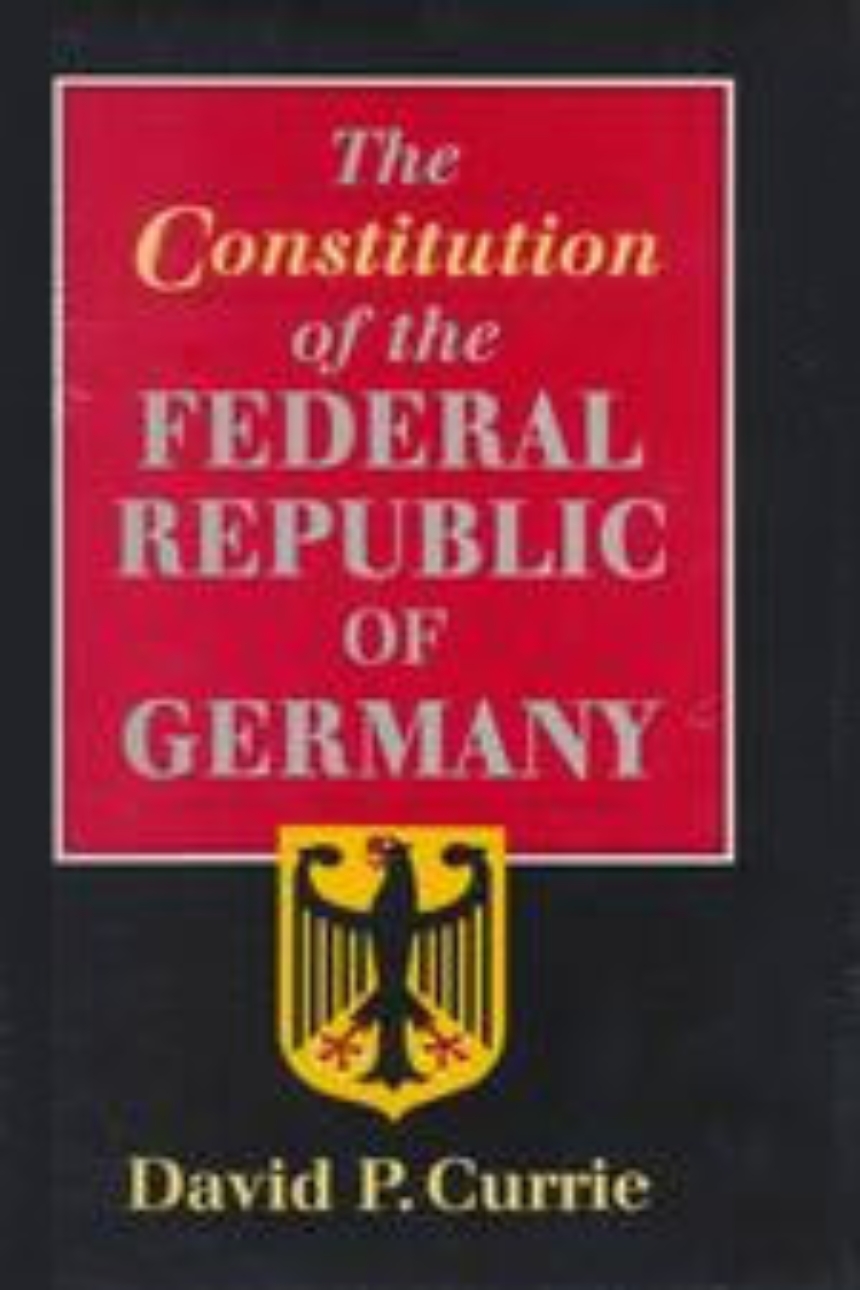The Constitution of the Federal Republic of Germany
A leading scholar of the constitution of the United States, David Currie, in this book turns his attention to one of the most important bodies of constitutional law in the world, the Basic Law of Germany. It is a comprehensive and accessible introduction to the study of the German constitution.
Beginning with an overview of the essential features of the Basic Law of Germany, Currie then elucidates those features by analyzing a number of decisions of the German Constitutional Court. Contrasting German constitutional law with the American model, Currie further illuminates the German system and provides an invaluable comparative perspective on American institutions, judicial methods, and constitutional principles.
The German constitutional court recently has become the object of international attention as it has grappled with controversies involving abortion, ratification of the Maastricht Treaty, and the reunification of East and West. Currie examines these issues and their impact on the German constitution.
An appendix includes (in English translation) the complete Basic Law for the Federal Republic of Germany of May 23, 1949 as amended to December 1, 1993.
Beginning with an overview of the essential features of the Basic Law of Germany, Currie then elucidates those features by analyzing a number of decisions of the German Constitutional Court. Contrasting German constitutional law with the American model, Currie further illuminates the German system and provides an invaluable comparative perspective on American institutions, judicial methods, and constitutional principles.
The German constitutional court recently has become the object of international attention as it has grappled with controversies involving abortion, ratification of the Maastricht Treaty, and the reunification of East and West. Currie examines these issues and their impact on the German constitution.
An appendix includes (in English translation) the complete Basic Law for the Federal Republic of Germany of May 23, 1949 as amended to December 1, 1993.
Reviews
Table of Contents
Preface
Abbreviations and Shortened Titles
1. Introduction
I. A Little History
II. The Basic Law
A. Fundamental Rights
B. Basic Structural Principles
1. The Rechtsstaat
2. The Sozialstaat
C. The Allocation of Powers
D. The Constitutional Court
E. Unification and Beyond
2. The Federal System
I. Legislative Powers
A. Exclusive Federal Authority
B. Concurrent Authority
C. Framework Legislation
D. Financial Provisions |
E. The Role of the Bundesrat
II. Other Powers
A. Executive Power
B. Judicial Power
III. The Bundestreue Principle
IV. Other Dimensions of Federalism
A. Local Government
B. The Federal Republic and Germany
C. The European Union
V. Conclusion
3. Separation of Powers
I. Legislative Powers
A. Electrons and Equal Rights
B. Autonomy and Stability
C. Supremacy
D. Exclusivity
E. Nondelegability
II. Executive Power
A. The President, the Chancellor, and the Cabinet
B. The Limits of Parliamentary Control
III. Judicial Power
A. Judicial Independence
B. Judicial Review
IV. Conclusion
4. Freedom of Expression
I. Balancing
A. Boycotts
B. Early Defamation Cases
C. Mephisto
D. Other Restrictive Decisions
E. The Trend toward Greater Protection
II. Political Parties
III. Subversion
A. Unconstitutional Parties
B. The Civil Service
C. Other Measures
IV. The Media
V. Academic Freedom
VI. Conclusion
5. Church and State
I. Establishment of Religion
II. Religious Freedoms
A. Conflicting Constitutional Rights
B. Exemptions from General Laws
1. Article 4(1) and (2)
2. The right of self-government
III. Conclusion
6. Other Fundamental Rights
I. Marriage, the Family, and Private Schools
A. Defensive Rights
B. Nondiscrimination
C. The Institutional Guarantee of Marriage
D. Affirmative Duties and Positive Rights
II. Property
A. Takings
B. Limitations
III. Occupational Freedom
IV. Life, Liberty, and Personality
A. Life and Liberty
B. Human Dignity
C. The Development of Personality
V. Equality
A. Classifications Expressly Prohibited
B. Sex Discrimination
C. The General Equality Provision
VI. Conclusion
Epilogue
Appendix: The Basic Law
Index
Abbreviations and Shortened Titles
1. Introduction
I. A Little History
II. The Basic Law
A. Fundamental Rights
B. Basic Structural Principles
1. The Rechtsstaat
2. The Sozialstaat
C. The Allocation of Powers
D. The Constitutional Court
E. Unification and Beyond
2. The Federal System
I. Legislative Powers
A. Exclusive Federal Authority
B. Concurrent Authority
C. Framework Legislation
D. Financial Provisions |
E. The Role of the Bundesrat
II. Other Powers
A. Executive Power
B. Judicial Power
III. The Bundestreue Principle
IV. Other Dimensions of Federalism
A. Local Government
B. The Federal Republic and Germany
C. The European Union
V. Conclusion
3. Separation of Powers
I. Legislative Powers
A. Electrons and Equal Rights
B. Autonomy and Stability
C. Supremacy
D. Exclusivity
E. Nondelegability
II. Executive Power
A. The President, the Chancellor, and the Cabinet
B. The Limits of Parliamentary Control
III. Judicial Power
A. Judicial Independence
B. Judicial Review
IV. Conclusion
4. Freedom of Expression
I. Balancing
A. Boycotts
B. Early Defamation Cases
C. Mephisto
D. Other Restrictive Decisions
E. The Trend toward Greater Protection
II. Political Parties
III. Subversion
A. Unconstitutional Parties
B. The Civil Service
C. Other Measures
IV. The Media
V. Academic Freedom
VI. Conclusion
5. Church and State
I. Establishment of Religion
II. Religious Freedoms
A. Conflicting Constitutional Rights
B. Exemptions from General Laws
1. Article 4(1) and (2)
2. The right of self-government
III. Conclusion
6. Other Fundamental Rights
I. Marriage, the Family, and Private Schools
A. Defensive Rights
B. Nondiscrimination
C. The Institutional Guarantee of Marriage
D. Affirmative Duties and Positive Rights
II. Property
A. Takings
B. Limitations
III. Occupational Freedom
IV. Life, Liberty, and Personality
A. Life and Liberty
B. Human Dignity
C. The Development of Personality
V. Equality
A. Classifications Expressly Prohibited
B. Sex Discrimination
C. The General Equality Provision
VI. Conclusion
Epilogue
Appendix: The Basic Law
Index
